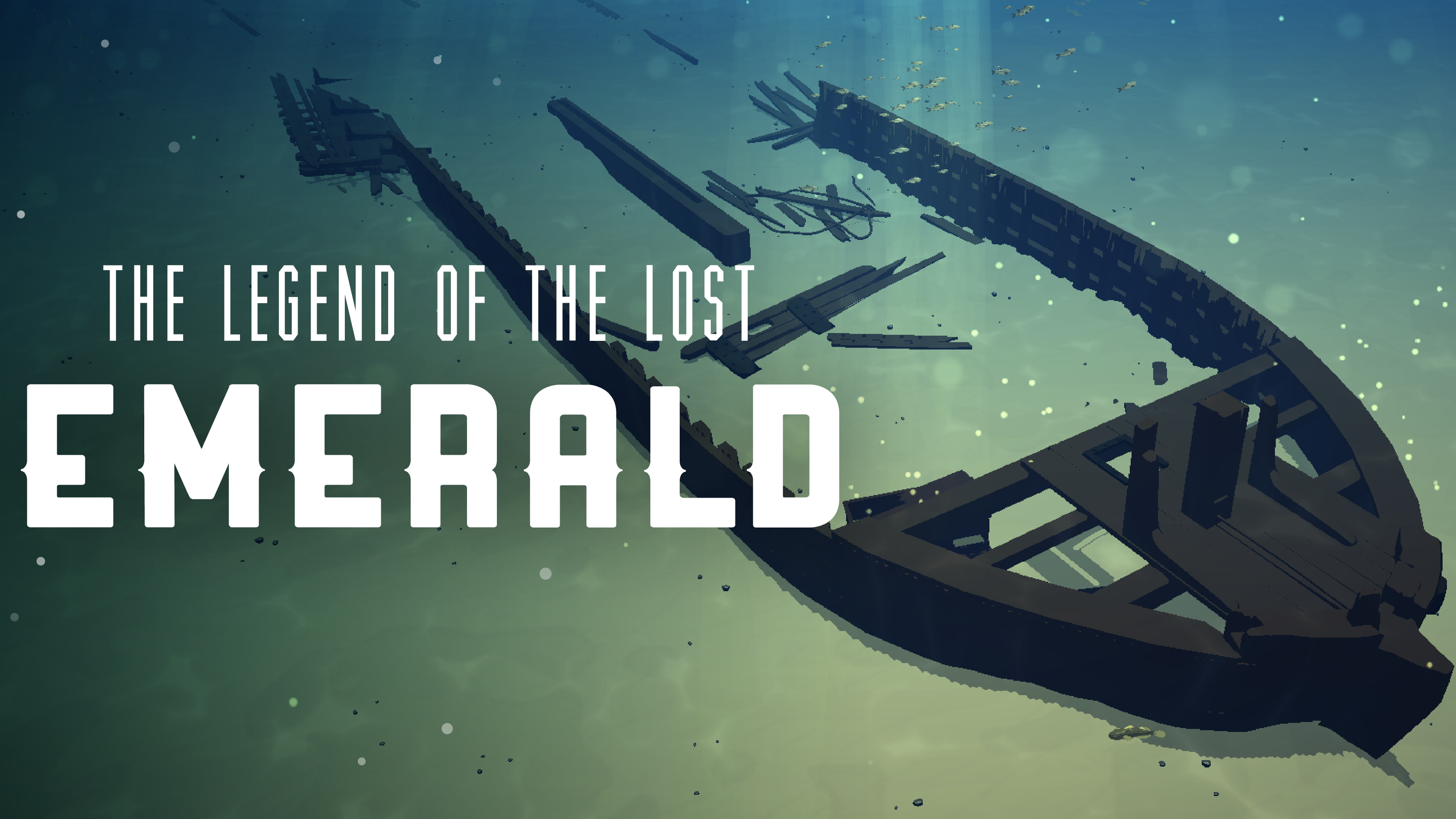Behind-the-scenes look at Great Lakes shipwrecks-focused video game
April 20, 2022 Leave a Comment
Released earlier this year, The Legend of the Lost Emerald is an adventure game where players use critical thinking and history skills when they step into the shoes of Jules, a maritime archaeologist. Designed for students in grades 4-6 and any others curious about Wisconsin maritime archeology and history, players dive underwater and gather clues to build evidence and uncover the real treasure — the stories of shipwrecks inspired by Great Lakes history.
The game was produced by PBS Wisconsin Education, Wisconsin Sea Grant, and Field Day Learning Games — an educational game developer within the University of Wisconsin-Madison’s Wisconsin Center for Education Research and Wisconsin educators. It complements the PBS Wisconsin Shipwrecks! documentary and virtual reality experience exploring wrecks on the bottom of Wisconsin’s Great Lakes.
Mike Scoville, a library media specialist for the Gibraltar Area School District in Fish Creek, Wisconsin, contributed to the development and testing of the online video game.
Scoville was one of 18 educators from across Wisconsin who contributed to the initial design and playtesting of the video game. We caught up with him to get a behind-the-scenes look at how the game was developed and tested with Wisconsin students.
The Legend of the Lost Emerald can be accessed for free at pbswisconsineducation.org.
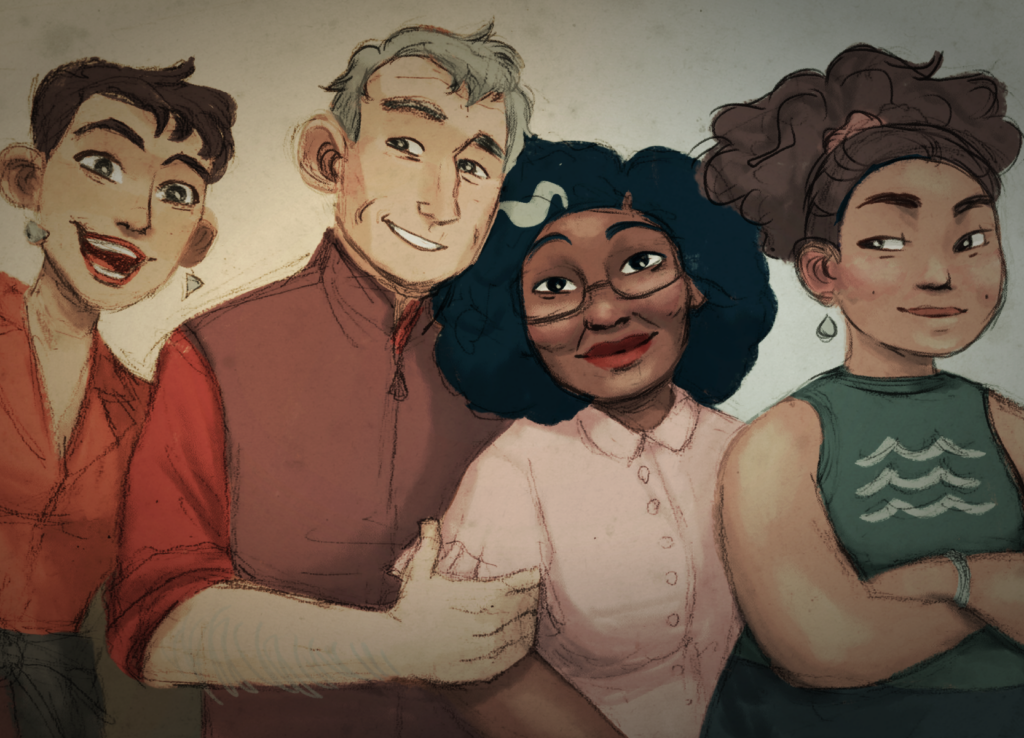
Characters from the video game.
PBS Wisconsin: How long have you been a teacher? What brought you to that field?
Mike Scoville: I have been teaching for 25 years and 23 at Gibraltar. When I was in first grade, I remember sitting in a circle and my teacher asked us what we wanted to be when we grew up. When it came to me I said a teacher. My teacher told me that I couldn’t be a teacher because I was a boy. Game on! It just made me work harder to be a teacher.
PBS Wisconsin: How did you get involved in the Field Day teacher fellow group?
Scoville: I was part of the education group that worked on Wisconsin Hometown Stories: Door County. That lead to my working with PBS Wisconsin Education. Then, when PBS partnered with Field Day Labs to work on a video game for the 100th anniversary of the state capitol building, I filled out the interest form and was selected to be a part. This led to Jo Wilder and the Capitol Case. Their process was so good and the other fellows brought such a diverse background to the project. When they shared they were going to do a project on shipwrecks, I was all in.
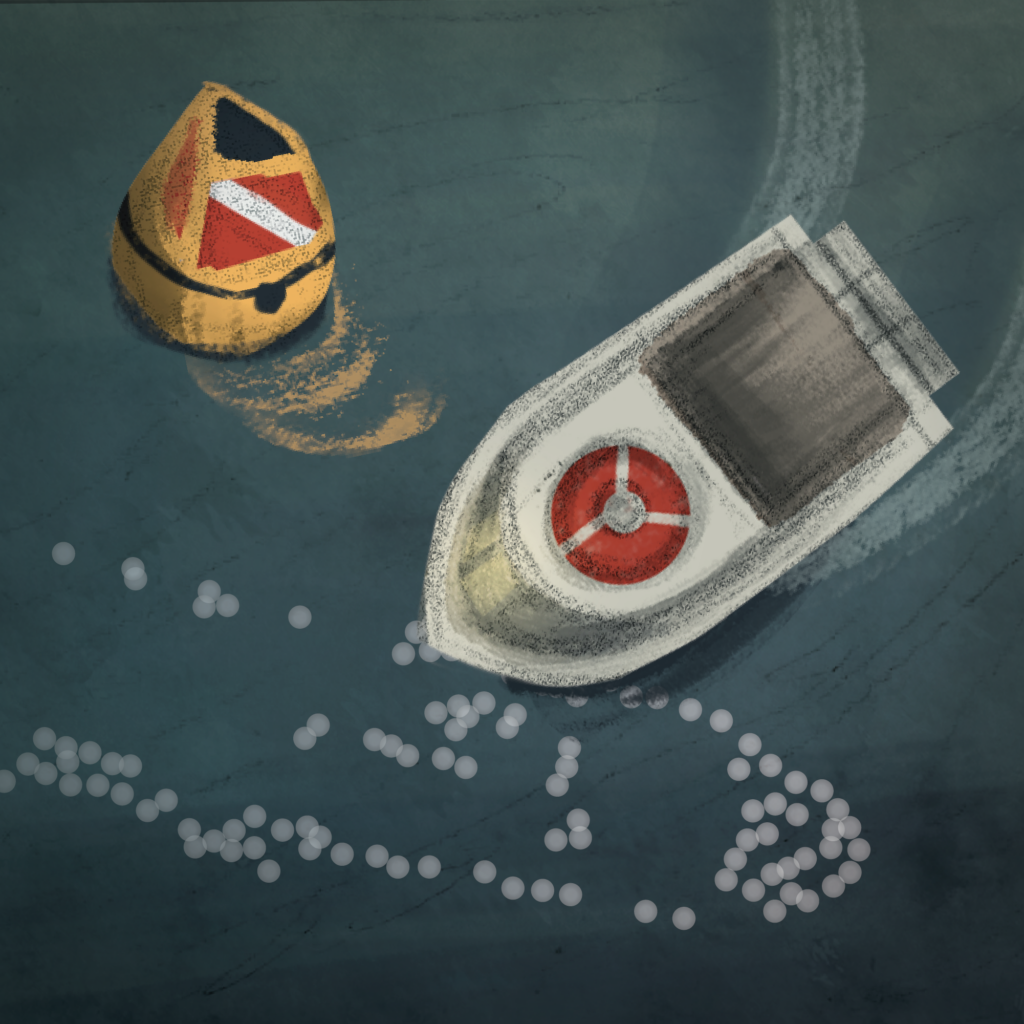
Game still of sonar boat.
PBS Wisconsin: What did the game’s development and design process look like?
Scoville: The game’s development and design process was so neat. I remember meeting at the maritime museum in Manitowoc, meeting the other fellows and then playing a variety of video games. This helped us to define what kind of a game to make. The hardest part of the project was knowing that it wasn’t my idea or someone else’s idea but a collaboration of bits and pieces from a bunch of ideas. Field Day has the process down pat. They know where they want to go and take tiny steps to get there. They are a great team to work with.
PBS Wisconsin: What was your favorite part of the process?
Scoville: My personal favorite part was meeting with the underwater archeologists. They shared their experiences and were so patient in answering our questions. They allowed us to touch and use their tools of the trade like special paper that they draw on underwater. Who knew? I remember the excitement as they shared. The hands-on part was so important to me. I don’t think this part can be missed if creating a game.
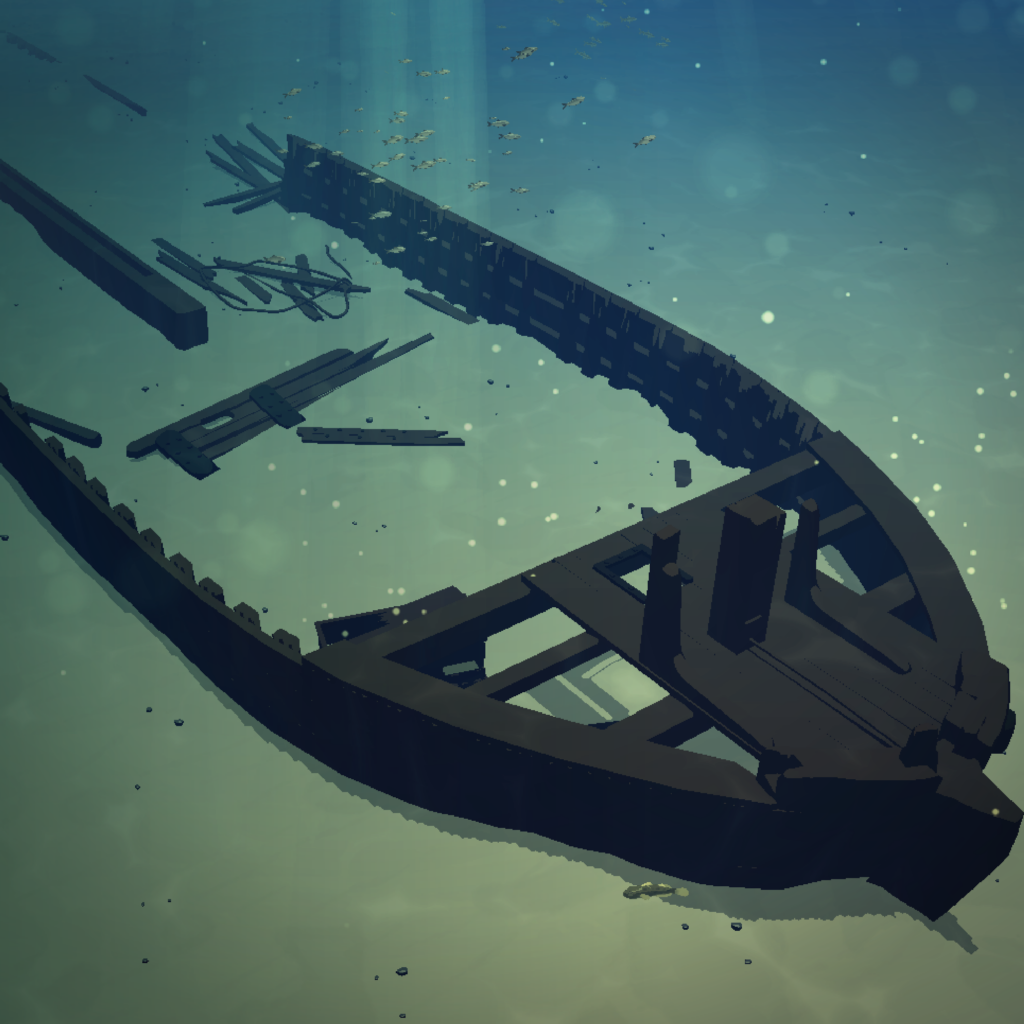
Game still of sunken ship.
PBS Wisconsin: How were your students involved? Any memorable moments from classroom testing?
Scoville: This project took a bit of time to complete. This gave me time to work with a few different classes. During the pandemic, I was reassigned to teach 6th grade. I had taught almost every subject in 6th for 15 years before moving to the library. This project gave my students something to look forward to during the pandemic. This class also had a lot of students who spent a lot of time playing video games. Working with Field Day, the students got to see the time and detail that goes into making a video game before the end user even presses start. We set up Zoom sessions to talk about character design and even the fashion of the characters. I play tested the game with 3rd-5th graders.
There were many memorable moments, but the one that really sticks out most was the end result of the diving sections. Students kept asking how come there were no fish as they swam down to the shipwrecks. So, I would send the comment into Field Day. The day they played the final version and there were fish swimming around during the dive scenes made my students so happy. They exclaimed things like “Yes, fish” and “Look, look” and even “Did you guys find the fish hiding?” Little details that they had wanted to see actually came true. I am sure there were other students who sent that comment in too.
PBS Wisconsin: How important are these types of classroom resources to your work as a teacher?
Scoville: Over the last years I have seen science and social studies take the back seat over reading and math curricula. I witnessed science and social studies topics not get addressed. I see students who are lacking science and social studies skills. If a game like The Legend of the Lost Emerald can bring students in and investigate history and science and help develop those skills, then I am all for it. I didn’t have to explain how to play the game. They naturally jumped in, feet first, and started working their way through. If they got stuck, they were allowed to ask someone else but not me. If they did ask someone else, that person was not allowed to give them the answer but instead explain. These resources are meeting the “new” student where they are and helping to develop new skills.
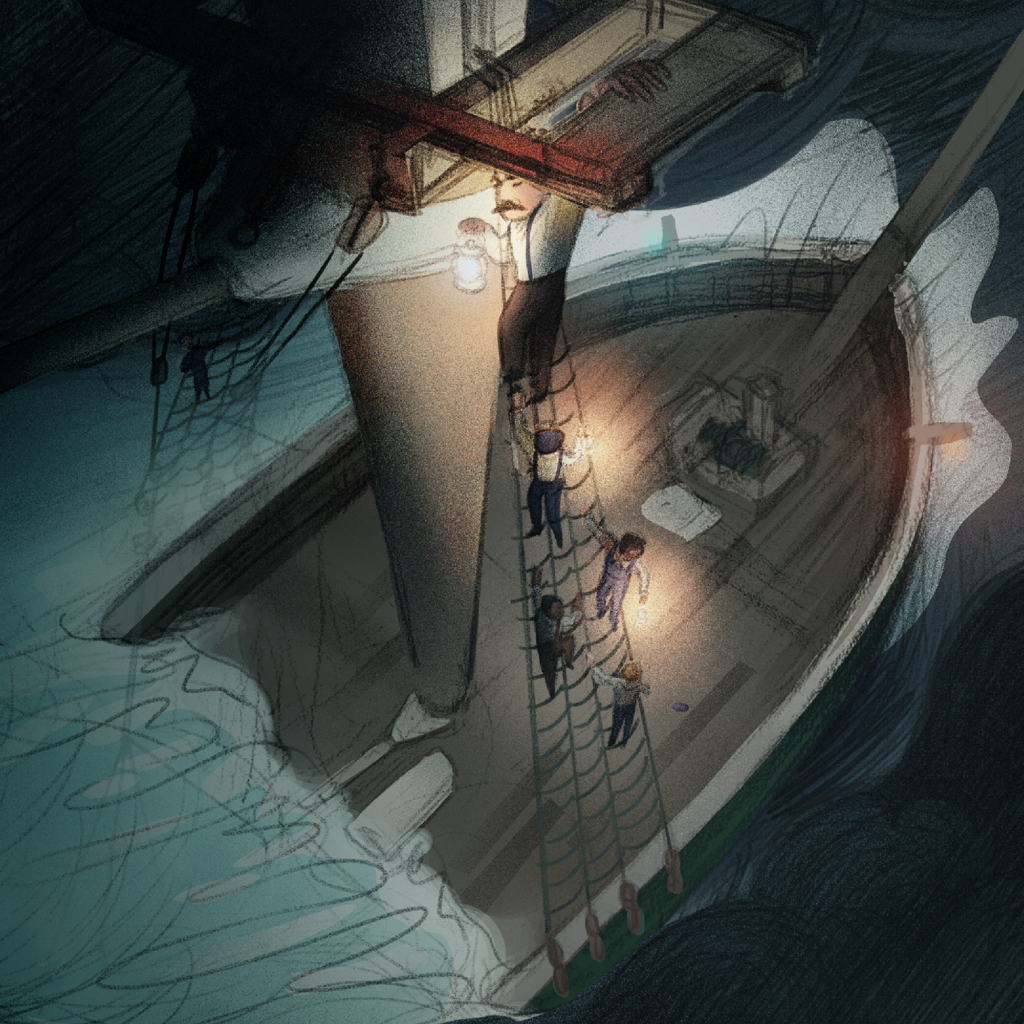
Game still of sinking ship.
PBS Wisconsin: What are your thoughts on having a local connection to the educational materials students are using? Is that important?
Scoville: I love the fact that I was part of a valuable resource that is shared worldwide. It is really interesting to have been a part of this project and know that just a few miles from the school there are shipwrecks. Students who have worked with the game creation find it fascinating that where they live there are shipwrecks. I find it incredibly important to have these resources and to have a personal and local connection.
PBS Wisconsin: What other types of classroom resources would you like to see from PBS Wisconsin Education?
Scoville: One of the things I have learned from PBS Wisconsin Education is that they are current. They have a superb team that works to keep their information and design up to date. They stretch the limit to bring in a variety of resources that look at the state as a whole and represent those areas that many do not know much about. I would love to see those weird, unique and kooky stories from Wisconsin shared. I would love to hear veterans and war survivors tell their stories before they are all gone. I would love to hear stories of everyday life from a large city and a rural farm, from children and from adults. If there is a way, I am sure PBS Wisconsin Education can make it happen. Thanks for all you do!
PBS Wisconsin Education Shipwrecks! Education Video Games Field Day Lab
 Passport
Passport




